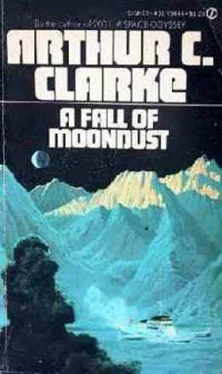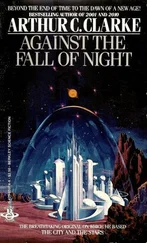Arthur Clarke - A Fall of Moondust
Здесь есть возможность читать онлайн «Arthur Clarke - A Fall of Moondust» весь текст электронной книги совершенно бесплатно (целиком полную версию без сокращений). В некоторых случаях можно слушать аудио, скачать через торрент в формате fb2 и присутствует краткое содержание. Жанр: Фантастика и фэнтези, на английском языке. Описание произведения, (предисловие) а так же отзывы посетителей доступны на портале библиотеки ЛибКат.
- Название:A Fall of Moondust
- Автор:
- Жанр:
- Год:неизвестен
- ISBN:нет данных
- Рейтинг книги:5 / 5. Голосов: 1
-
Избранное:Добавить в избранное
- Отзывы:
-
Ваша оценка:
- 100
- 1
- 2
- 3
- 4
- 5
A Fall of Moondust: краткое содержание, описание и аннотация
Предлагаем к чтению аннотацию, описание, краткое содержание или предисловие (зависит от того, что написал сам автор книги «A Fall of Moondust»). Если вы не нашли необходимую информацию о книге — напишите в комментариях, мы постараемся отыскать её.
A Fall of Moondust — читать онлайн бесплатно полную книгу (весь текст) целиком
Ниже представлен текст книги, разбитый по страницам. Система сохранения места последней прочитанной страницы, позволяет с удобством читать онлайн бесплатно книгу «A Fall of Moondust», без необходимости каждый раз заново искать на чём Вы остановились. Поставьте закладку, и сможете в любой момент перейти на страницу, на которой закончили чтение.
Интервал:
Закладка:
“You want to say something, Mister Radley?” asked Pat. Radley looked around the dim-lit cabin, rather like a schoolmaster about to address a class.
“Yes, Captain”, he began. “I have a confession to make. I am very much afraid that this is all my fault.”
When Chief Engineer Lawrence broke off his commentary, Earth knew within two seconds that something had gone wrong — though it took several minutes for the news to reach Mars and Venus. But what had happened, no one could guess from the picture on the screen. For a few seconds there had been a flurry of frantic but meaningless activity, but now the immediate crisis seemed to be over. The space-suited figures were huddled together, obviously in conference — and with their telephone circuits plugged in, so that no one could overhear them. It was very frustrating to watch that silent discussion, and to have no idea of what it was about.
During those long minutes of agonizing suspense, while the studio was trying to discover what was happening, Jules did his best to keep the picture alive. It was an extremely difficult job, handling such a static scene from a single camera position. Like all cameramen, Jules hated to be pinned down in one spot. This site was perfect, but it was fixed, and he was getting rather tired of it. He had even asked if the ship could be moved, but as Captain Anson put it, “I'm damned if I'll go hopping back and forth over the mountains. This is a spaceship, not a — a chamois.”
So Jules had to ring the changes on pans and zooms, though he used the latter with discretion, because nothing upset viewers more quickly than being hurled back and forth through space, or watching scenery explode in their faces. If he used the power-zoom flat out, Jules could sweep across the Moon at about fifty thousand kilometers an hour — and several million viewers would get motion sickness.
At last that urgent, soundless conference was breaking up; the men on the raft were unplugging their telephones. Now, perhaps, Lawrence would answer the radio calls that had been bombarding him for the last five minutes.
“My God”, said Spenser, “I don't believe it! Do you see what they're doing?”
“Yes”, said Captain Anson, “and I don't believe it either. But it looks as if they're abandoning the site.”
Like lifeboats leaving a sinking ship, the two dust-skis, crowded with men, were pulling away from the raft.
CHAPTER 26
Perhaps it was well that Selene was now out of radio contact; it would hardly have helped morale if her occupants had known that the skis, heavily overloaded with passengers, were heading away from the site. But at the moment, no one in the cruiser was thinking of the rescue effort; Radleyas holding the center of the dimly lit stage.
“What do you mean — this is all your fault?” asked Pat in the baffled silence that followed the New Zealander's statement — only baffled as yet; not hostile, because no one could take such a remark seriously.
“It's a long story, Captain”, said Radley, speaking in a voice that, though it was oddly unemotional, had undertones that Pat could not identify. It was almost like listening to a robot, and it gave Pat an unpleasant feeling somewhere in the middle of his spine. “I don't mean to say that I deliberately caused this to happen. But I'm afraid it is deliberate, and I'm sorry to have involved you all. You see — they are after me.”
This is all we need, thought Pat. We really seem to have the odds stacked against us. In this small company we've got a neurotic spinster, a drug addict — and now a maniac. What other freaks are going to reveal themselves before we're finished?
Then he realized the unfairness of his judgment. The truth was that he had been very lucky. Against Radley, Miss Morley, and Hans Baldur (who had given no trouble after that single, never-mentioned incident), he had the Commodore, Dr. McKenzie, the Schusters, little Professor Jayawardene, David Barrett — and all the others who had done as they were asked, without making a fuss. He felt a sudden surge of affection — even of love — toward them all, for giving him their active or passive support.
And especially toward Sue, who was already one jump ahead of him, as she always seemed to be. There she was, moving unobtrusively about her duties at the back of the cabin. Pat doubted if anyone noticed — certainly Radley did not — as she opened the medicine chest and palmed one of those cigarettesized cylinders of oblivion. If this fellow gave trouble, she would be ready.
At the moment, trouble seemed the furthest thing from Radley's mind. He appeared to be completely self-possessed and perfectly rational; there was no mad gleam in his eye, or any other of the cliches of insanity. He looked exactly what he was — a middle-aged New Zealand accountant taking a holiday on the Moon.
“This is very interesting, Mister Radley”, said Commodore Hansteen in a carefully neutral voice, “but please excuse our ignorance. Who are 'they,' and why should they be after you?”
“I am sure, Commodore, that you've heard of flying saucers?”
Flying what? Pat asked himself. Hansteen seemed better informed than he was.
“Yes, I have”, he answered a little wearily. “I've come across them in old books on astronautics. They were quite a craze, weren't they, about eighty years ago?”
He realized that “craze” was an unfortunate word to use, and was relieved when Radley took no offense.
“Oh”, he answered, “they go back much further than that, but it was only in the last century that people started to take notice of them. There's an old manuscript from an English abbey dated 1290 that describes one in detail — and that isn't the earliest report, by any means. More than ten thousand flying saucer sightings have been recorded prior to the twentieth century.”
“Just a minute”, interrupted Pat. “What the devil do you mean by 'flying saucer'? I've never heard of them.”
“Then I'm afraid, Captain, that your education has been neglected”, answered Radley in a sorrowful voice. “The term 'flying saucer' came into general use after 1947 to describe the strange, usually disc-shaped vehicles that have been investigating our planet for centuries. Some people prefer to use the phrase 'unidentified flying objects.'”
That aroused a few faint memories in Pat's mind. Yes, he had heard that term in connection with the hypothetical Outsiders. But there was no concrete evidence, of course, that alien space vessels had ever entered the solar system.
“Do you really believe”, said one of the other passengers skeptically, “that there are visitors from space hanging round the Earth?”
“Much more than that”, answered Radley. “They've often landed and made contact with human beings. Before we came here, they had a base on Farside, but they destroyed it when the first survey rockets started taking close-ups.”
“How do you know all this?” asked someone else.
Radley seemed quite indifferent to the skepticism of his audience; he must have grown used to this response long ago. He radiated a kind of inner faith which, however ill-founded it might be, was oddly convincing. His insanity had exalted him into the realm beyond reason, and he was quite happy there.
“We have — contacts”, he answered with an air of great importance. “A few men and women have been able to establish telepathic communication with the saucer people. So we know a good deal about them.”
“How is it that no one else does?” asked another disbeliever. “If they're really out there, why haven't our astronomers and space pilots seen them?”
“Oh, but they have”, Radley answered with a pitying smile, “and they're keeping quiet. There's a conspiracy of silence among the scientists; they don't like to admit that there are intelligences out in space so much superior to ours. So when a pilot does report a saucer, they make fun of him. Now, of course, every astronaut keeps quiet when he meets one.”
Читать дальшеИнтервал:
Закладка:
Похожие книги на «A Fall of Moondust»
Представляем Вашему вниманию похожие книги на «A Fall of Moondust» списком для выбора. Мы отобрали схожую по названию и смыслу литературу в надежде предоставить читателям больше вариантов отыскать новые, интересные, ещё непрочитанные произведения.
Обсуждение, отзывы о книге «A Fall of Moondust» и просто собственные мнения читателей. Оставьте ваши комментарии, напишите, что Вы думаете о произведении, его смысле или главных героях. Укажите что конкретно понравилось, а что нет, и почему Вы так считаете.












